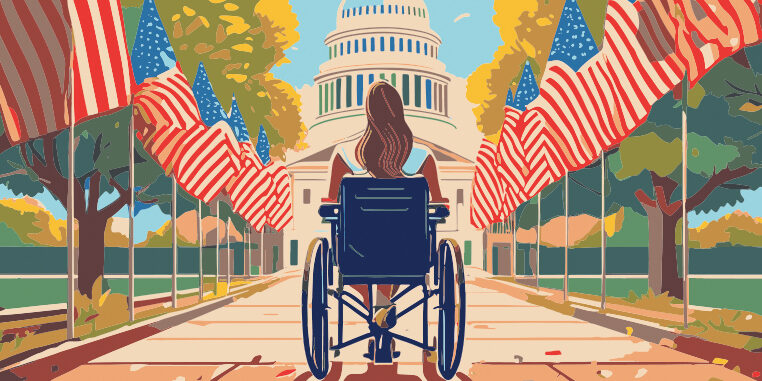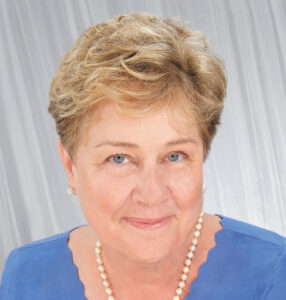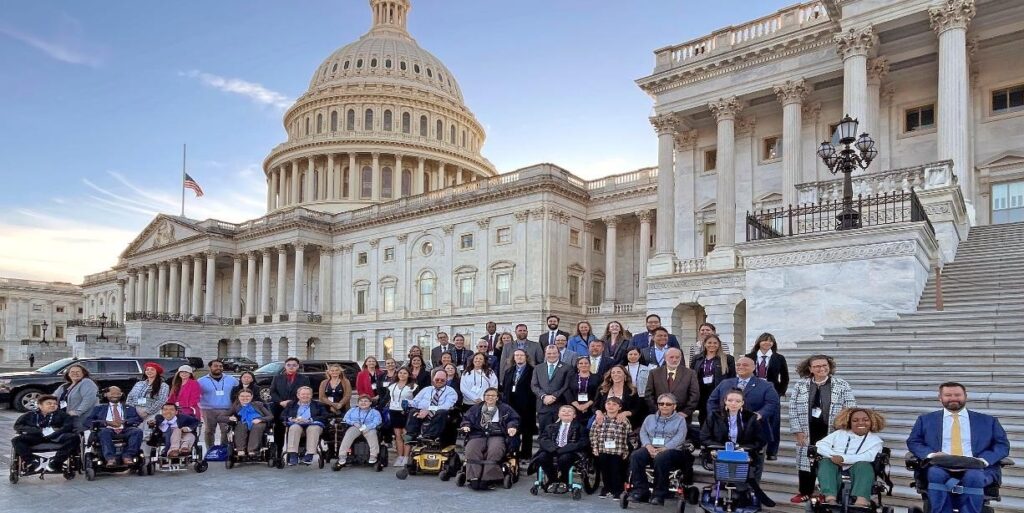
Your Vote Matters: Disability Advocates Can Help Change Legislation for the Better
By Steve Wright | Tuesday, August 13, 2024
5 Second Summary
Voters and advocates with disabilities have been making positive change for decades. It’s important that we continue to make our voices heard to influence legislation for the better.
When you think about great legislation for people with disabilities, you probably think of the Americans with Disabilities Act of 1990 (ADA). This important law prohibits discrimination against individuals with disabilities in many areas of public life, including jobs, schools, businesses, and transportation. It is designed to ensure that people with disabilities have the same rights and opportunities as everyone else.

Deborah McFadden
“The disability community came together to make this landmark law, showing the collective power we have,” says Deborah McFadden, who was instrumental in writing the ADA and getting it passed in her role as US Commissioner of Disabilities under President George H. W. Bush. Deborah now operates Abilities Count to assist families in navigating disability benefits.
“While passing the ADA was a major achievement for the disability community, much work remains to be done,” she says. “I can’t emphasize enough how important it is to make your voice heard.”
Thanks to the dedication of countless advocates like Deborah, in the decades since the ADA was passed, we have seen some important progress in public policy and disability awareness. From lobbying efforts by MDA and other organizations to calls, emails, and letters to representatives by grassroots advocates, making our voices heard has been a powerful tool for change.
Success stories
It’s encouraging to look at how the disability community has positively influenced public policy regarding disability benefits in the last few years.
In 2022, Congress passed the ABLE Age Adjustment Act. Starting in 2026, the age of onset of disability to be eligible for an ABLE account will change from 26 to 46. These tax-advantaged savings accounts allow individuals with disabilities to save and pay for disability-related expenses without endangering their benefits. The policy change is estimated to make an additional 6 million people eligible for ABLE accounts.
In addition, the 2022 Inflation Reduction Act requires Medicare to cap the out-of-pocket costs of medications at $2,000 starting in 2025. Currently, people with neuromuscular diseases on Medicare can see drug costs in the many thousands of dollars. Advocates from the neuromuscular and disability communities who contacted their members of Congress were crucial in getting this law passed.
In 2023, MDA teamed up with other disability advocacy organizations to successfully defend the Medicaid program from work requirements and cuts that would have made it harder to qualify for Medicaid services or reduced benefits for people with disabilities.
Another win for the neuromuscular community came in May 2023, when Medicare announced it would cover seat elevation systems for power wheelchairs. Leading up to the announcement, the MDA Advocacy team submitted formal comments to the Centers for Medicare and Medicaid Services (CMS) supporting this additional coverage. In addition, MDA’s grassroots advocates sent in their own personal comments encouraging the CMS to make this change.
“Our advocates are spectacular at telling their stories to show why changes to laws and rules are important,” says Mark Fisher, MDA’s Director of Advocacy Engagement. “One thing I love about advocacy at MDA is how our advocates fight so hard for change, whether it’s a big piece of legislation or a small tweak within an agency. I’m so proud of what our advocates have accomplished.”
Advocacy in flight
Improving air travel for people with disabilities is an area MDA has been engaged in for many years.
For example, in 2022, the US Department of Transportation (DOT) held a listening session on air travel with wheelchair users. People with neuromuscular diseases were among the broad base of advocates who detailed unacceptable conditions — everything from injuries caused by improper seat transfers to damaged mobility devices. In response, the DOT released the Airline Passengers with Disabilities Bill of Rights.
In late 2023, after MDA advocates shared their personal air travel experiences with Transportation Security Administration (TSA) officials, the TSA invited MDA to provide officer training on interacting with travelers who use mobility devices.
This year, Congress passed the long-awaited Federal Aviation Administration (FAA) reauthorization. This major piece of legislation includes reforms that will make air travel more accessible for people with disabilities, including:
- Airport and airline personnel will receive stronger, hands-on training on assisting passengers with disabilities and stowing wheelchairs.
- Airlines will be held accountable for reporting damage to wheelchairs.
- The FAA will continue to study the option of allowing passengers to stay in their wheelchairs during flight.
- People with disabilities will have a seat at the table when the government makes future decisions about air travel.
This law is the result of advocates sharing their air travel stories and telling lawmakers how the provisions in the bill will improve their flying experience. MDA advocates made personal connections with their representatives to provide key information during the reauthorization process.
“I would say that accessible air travel is one area where MDA has helped create immense progress,” Mark says.
Current issues
While the neuromuscular and disability communities celebrate the progress made, they know there is still much to do to ensure that people with disabilities have the same opportunities as everyone else.
“Our community has told us to focus on reforming federal benefit programs, to prioritize SSI benefits that are better tailored to the century we live in,” says Paul Melmeyer, MDA’s Vice President of Public Policy and Advocacy. “Without changes, people risk SSI or Medicaid benefits if they pursue a career and their pay makes them ineligible.”
The Supplemental Social Security Income (SSI) Penalty Elimination Act, introduced in the Senate in 2023, addresses this issue. If approved, it would increase SSI asset limits from $2,000 for individuals and $3,000 for couples to $10,000 for individuals and $20,000 for couples — and these limits would be adjusted annually for inflation. This would make it easier for individuals with disabilities to hold jobs and save for unexpected expenses without jeopardizing their benefits.
Congress is also considering legislation related to Home and Community-Based Services (HCBS). The HCBS Access Act would increase access to in-home caregiving for people who need assistance with activities of daily living, such as bathing and dressing. The HCBS Relief Act supplies temporary additional funding for HCBS services with the goal of increasing the caregiver workforce.
Other important issues and pending legislation include:
- Making sure telehealth continues to be accessible for those who use it for essential medical care.
- Increasing access to genetic medicine and counseling.
- Improving access to specialized multidisciplinary care for the amyotrophic lateral sclerosis (ALS) community via the ALS Better Care Act.
Access to voting

Shaun Hill
From the presidential election in November to the thousands of statewide, district, and local races taking place throughout the year, MDA encourages its members to make their voices heard at the ballot box.
Shaun Hill, MDA’s Manager of Public Policy and Advocacy, is leading the Access the Vote campaign to provide resources and guidance for navigating the electoral process. She urges MDA members to use their right to vote to champion legislation impacting the disability community.
“Access the Vote is all about education, engagement, and empowerment,” Shaun says. “The initiative aims to help people understand our government, the issues that affect our community, and how these things intersect with our daily lives.”
Along with teaching individuals how to be active, informed voters, Access the Vote addresses the barriers people with disabilities still face to exercising their right to vote — from lack of transportation to inaccessible voting machines. It is a vital resource for information on disability voting rights and practical tools for preparing to vote.
Deborah recounts: “I was talking to five people who had just turned 18 that I helped with SSI and vocational rehabilitation, and I asked them if they were registered to vote. Not one was. I told them voting is the cornerstone of Democracy. If there is one thing I can say to parents of children with disabilities, it is to vote and encourage your children to register when they turn 18.”
MDA wants to ensure that everyone in the neuromuscular community has the knowledge and opportunity to engage in the electoral process at all levels of government.
Making our voices heard
Voting is a right of all Americans, but too few are exercising that right. According to the US Census Bureau, 67% of eligible voters cast ballots in the 2020 presidential election, but 62% of people with disabilities voted. An analysis by the Election Assistance Commission found that if people with disabilities had voted at the same rate as people without disabilities, there would have been about 1.75 million more voters.
“One in four people have a disability. It’s the largest minority voting bloc in America. It is even bigger when you consider the family, friends, and caregivers,” Deborah says. “Our voices have been heard. But if we were even more active — as voters and as advocates pressing for inclusion — we would have a huge voice that could positively impact many things.”
Steve Wright is an award-winning writer and advocate based in Miami. He lectures throughout the US and abroad on creating a better built environment for people with disabilities.
One Person Can Make a Difference
Two MDA advocates on the power of sharing your story:
“There were eight kids in my family, and five of us have limb-girdle muscular dystrophy [LGMD], and I have two nieces with LGMD. I was more involved in advocacy after I was in the first gene therapy trial for muscular dystrophy back in 1999. It opened up doors for me to tell my story and to try to get the government to help people living with neuromuscular diseases.
I believe one person can make a difference in telling their story and connecting to the political people in Washington, DC, because it’s the personal stories that politicians need to hear.
I hope that being involved in advocacy will make a difference for my family and others.” — Donavon Decker, Kansas
“I had the typical misdiagnosis journey before I learned I have facioscapulohumeral muscular dystrophy [FSHD].
One of the many things I love about MDA Advocacy is they send emails encouraging us to advocate. These emails are filled with all the information you need to send comments to senators and representatives. With one positive experience reaching out to your elected officials, you get a good handle on how easy it is to do, how worthwhile it is, and how you can make an impact on many individuals’ lives.
One person advocating can make a big difference. It is like that little snowball rolling down a hill that just keeps getting bigger and bigger and bigger.” — Ranae Beeker, Washington State
Next Steps and Useful Resources
- Did you know the Voting Rights Act of 1965 allows a person with a disability to bring a friend, family member, or other person to help them vote? Brush up on voting rights and local resources with MDA’s Access the Vote.
- Watch the MDA Advocacy webinar Know Your Voting Rights.
- Stay up-to-date on Quest content! Subscribe to Quest Magazine and Newsletter.
Disclaimer: No content on this site should ever be used as a substitute for direct medical advice from your doctor or other qualified clinician.




